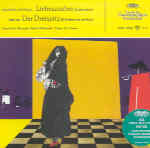There was a time when DG was a provincial German label, German orchestras were pretty mediocre, and just about any release not containing German basic repertoire (and many that did) was almost guaranteed to be unidiomatic and dull. If you feel nostalgia for that time (much of the 1950s), the yellow label’s horribly named series “Musik…sprach der Welt” is just the ticket. Actually, what the series ought to be called is “This material is all public domain anyway and it costs us nothing to release, so we might as well try to make a quick buck while we can before it winds up on some pirate label or on some other label’s historical series.” But that’s a little bit lengthy to fit conveniently on a tray card, right?
Besides, I’m sure that there are historical recording fans out there pining away for the greatest hits of such sexy and risk-taking conductors as Fritz Lehmann, Otto Gerdes, and Ferdinand Leitner, those avatars of the German Kapellmeister tradition, where all music, irrespective of its actual time signature and idiom, had to sound as if it were written in a moderate 4/4 and orchestrated by a bad imitator of Brahms. It was exactly this sort of approach that made sloppy but exciting conductors like Furtwängler, as well as fanatical disciplinarians like Toscanini, so important and useful a corrective to the “business as usual” conducting that we find here.
To be fair, some of these performances aren’t horrifically bad (the Debussy is efficient), but the colorless, bland, mechanical Saint-Saëns items certainly are atrocious. The Bacchanal sounds about as alluring as liver with chocolate sauce, and the Danse macabre barely qualifies as a waltz, let alone an example of orchestral diablerie. España is mercilessly rushed, its articulation blurred, and the playing of the Bambergers is not so much bad as simply wrong: grim and charmless.
Lehmann has the Berlin Philharmonic for the remainder of the program, and the string playing is typically decent, but the conducting isn’t. In El amor brujo, Lehmann again rushes through the Danza del terror, and you can practically hear him counting to seven in the famous Pantomina, which drags on interminably. The critical solo oboe is neat, correct, and about as far from this wailing, erotic, and passionate idiom as, well, Berlin is from Madrid. Only singer Diana Eustrati brings a touch of authenticity to the proceedings. Her numbers go well, despite Lehmann treating the “col legno” strings in the Canción del amore dolido like soloists in some sort of S&M flagellation concerto.
The dances from The Three-Cornered Hat are simply bizarre. Lehmann cuts the Dance of the Miller’s Wife in half, omitting the section called “The Grapes”, and jumps instead to the Corregidor’s Dance in the second half of the ballet (linking the two with an unnecessary double-dose of humorless solo bassoon). It goes without saying that the final dance is stiff, the brass blat vulgarly, and of course the bass drum, tam-tam, and timpani are hardly in evidence, save when Lehmann adds timpani to the final snare drum roll, just to make sure he has left his mark on the piece. The sound is clear, lacking in bass, but otherwise clean enough to let you hear just how unidiomatic and misguided these interpretations are. A party disc, perhaps? No, it’s way too earnest for that. More like a no-finer-alternative purchase for Germans in the 1950s.
































